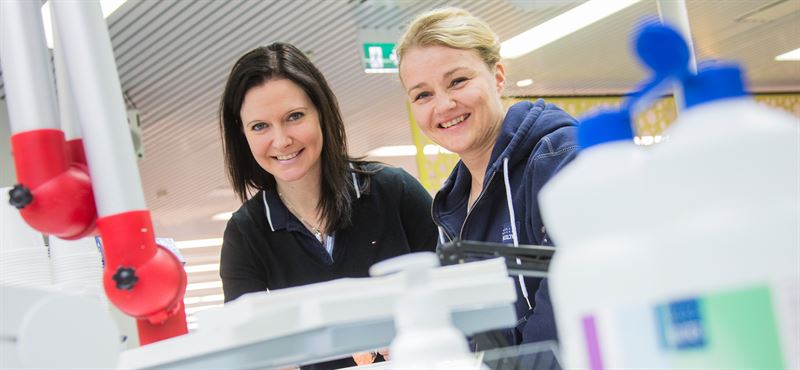Kiilto regularly trains its employees. In 2017, Kiilto's ProWay and HighWay development projects were launched. Their purpose is to challenge old operating models and generate added energy and efficiency in the workplace.
Product development manager Marjaana Mussalo participated in the Kiilto HighWay training for supervisors, and laboratory engineer Siru Rohola, a member of Mussalo’s team, participated in the Kiilto ProWay development programme for specialists.
Both felt that the training changed their ways of working. Their work has become more efficient, and the team’s joint processes are progressing faster than before. The training also provided practical tips for clarifying one’s own work and prioritising tasks.
“I found the training really useful, and it also helped me to make changes to my working habits in practice”, says Mussalo. “I learned more about delegating responsibilities. Now, because I assign more tasks to my team, I have more time for what you could call my real job, which is product development and coming up with new ideas”.
“Shared responsibilities and self-guidance also motivate the team members, and they are encouraged to bring out their own ideas for development”.
Rohola confirms that the training has brought added drive to the product development team: “Marjaana’s increased trust in us has given us a freer hand in taking care of things independently. This has speeded up the projects and made things more effective overall”.
People have a habit of getting stuck in routines and in doing certain things “the way they’ve always been done”. ProWay also helped in learning how to see things from a new standpoint.
“Now I can make better use of my knowledge of product safety-related matters, for example, in managing other projects and product development tasks”, says Rohola. “In this way, the processes can also move ahead faster”.
Project thinking for everyday life
Purchasing manager Liisa Tuominen participated in the ProWay training pilot project that began in autumn of 2017. She learned new development ideas and operating models that helped in managing her own workflows. A lot of things learned through the training have also stayed in mind for future changes.
“I’ve changed my working habits in my daily work. Project thinking is also well suited to the jobs that make up a typical working day”, Tuominen says. “I’ve created an Excel spreadsheet, which has a list of all the tasks that I’m responsible for on each project. The list is growing and being edited all the time as the projects progress and depending on the status of each task. “
The staff also have an important role in the future plans for Kiilto.
“Ambitious growth targets require well-planned and systematic work in order to ensure that everything goes smoothly”, says Tuominen. “The ProWay programme contributes to supporting our common goals.”
Targeted development work continues
The pilot group for the HighWay programme undertook the programme’s six courses over nearly a year and a half. In the future, the duration of the programme will be slightly shorter. In addition to the training days, the study units included advance assignments, home assignments and a final project. Both the Kiilto ProWay programme and the HighWay programme will continue in 2018, and new training periods have already begun.
The aim is for all Kiilto specialists to complete the ProWay development program.
“It’s good that all specialists are involved in the ProWay programme. As the participants develop more and more effective and efficient working practices and we are all on the same wavelength at work, it has a positive effect on the entire work culture”, Rohola says.
Mussalo is in agreement: “The whole of our company’s operating model has changed greatly in recent years”. “As new staff have joined the management level in particular, the company’s business culture has become so swift that more and more training and transformation of thought patterns are needed”.
The development programs bring together experts from throughout Kiilto.
“It was good to hear the views of other participants about our work with customers and our operating models”, Mussalo adds. “Now each of us can better understand how our own work affects the progress of the entire process chain, including the work of other departments”.
